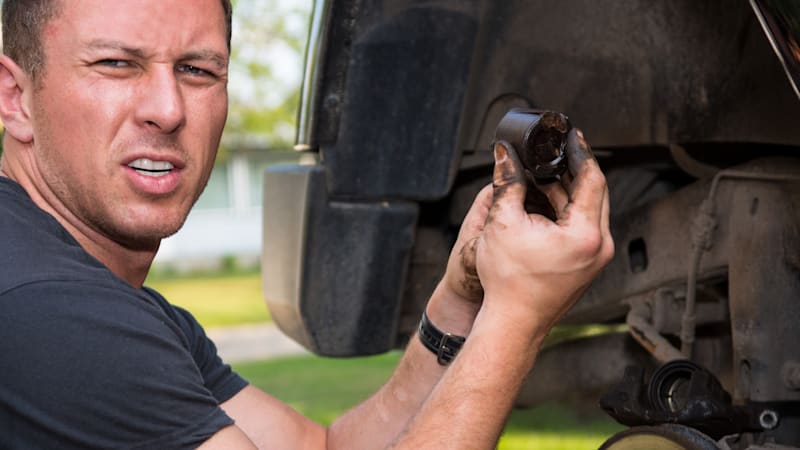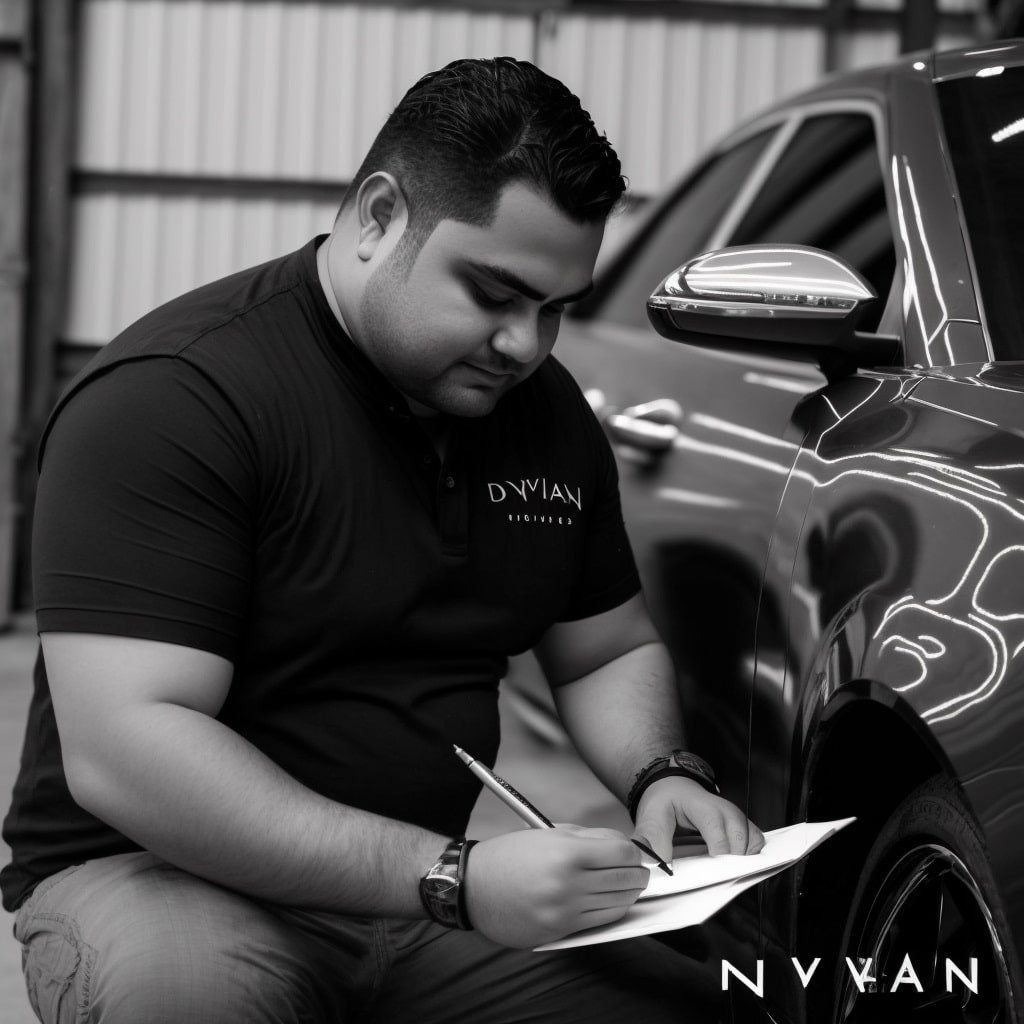Last Updated on February 1, 2023 by Ryan
When you brake, the calipers squeeze the brake pads against the rotors. If the calipers or brake pads are worn out, they can start to make a clicking noise. The clicking noise is usually caused by a small stone or piece of debris that’s become lodged between the rotor and pad.
If you’re hearing a clicking noise when you brake, there’s a good chance that your brake pads are the culprit. Over time, brake pads can wear down and become thinner. When this happens, they may start to make a clicking noise as they press against the rotors.
If the pads are extremely thin, they may also start to vibrate, which can cause even more noise.
If your brake pads are the problem, it’s important to replace them as soon as possible. Worn-out brake pads not only make noise, but they can also reduce your stopping power and increase your braking distance.
So if you’re hearing any type of strange noise coming from your brakes, be sure to have them checked out by a professional right away.
Brake Click Noise Driving Me Crazy – How To Fix It
Why Do I Hear a Clicking Noise When I Brake?
If you’re hearing a clicking noise when you brake, it’s likely due to a foreign object caught in your brakes. This can be anything from a small rock or piece of debris to a large chunk of metal or even glass. Regardless of the size of the object, it’s important to have it removed as soon as possible to avoid further damage to your brakes.
The first thing you’ll want to do is visually inspect your brakes to see if you can spot the object that’s causing the noise. If you can’t see anything, then it’s time to give your brakes a good listen. Start by lightly pressing on your brake pedal and listening for the noise.
If you hear it while depressing the pedal, then it’s likely coming from your brake pads or calipers. However, if you only hear the noise when releasing the pedal, then it’s likely coming from your rotors.
Once you’ve determined where the noise is coming from, it’s time to remove the object and get your brakes back in working order.
If the object is lodged in your brake pads, then simply removing the pads and cleaning them off should do the trick. If the object is caught in your calipers, then you may need to use a pair of needle-nose pliers or another tool to remove it. And finally, if the object is stuck in your rotors, then you’ll need to take them off and either clean them out or replace them entirely.
In most cases, a simple inspection and removal of any foreign objects will fix clicking brakes; however, if there appears to be extensive damage, then it’s best to consult with a professional mechanic before attempting any repairs on your own.
Why Does My Car Make a Clicking Noise When I Slow Down?
If you’re hearing a clicking noise when you slow down, it’s likely due to a problem with your brakes. When you press the brake pedal, the calipers squeeze the brake pads against the rotors to slow the wheels. If there’s something wrong with the calipers, they may not be able to release the brakes properly, which can cause a clicking noise.
There are a few other possibilities as well. The clicking could be coming from a loose heat shield or exhaust pipe, or it could be an indication that your CV joint is starting to fail. If you’re unsure what’s causing the noise, have it checked out by a mechanic so they can diagnose and fix the problem.
Do Rotors Make a Clicking Sound?
If your brake rotors are making a clicking sound, it’s likely because they’re worn out and need to be replaced. Rotors can wear down for a number of reasons, including normal wear and tear, driving in stop-and-go traffic, or hard braking. When the brake pads rub against the rotors, they can cause a clicking sound.
If the problem is left unchecked, it can eventually lead to more serious issues like brake fade or failure.
What Would Cause a Clicking Noise in Front Wheels?
If you’re hearing a clicking noise coming from your front wheels, there are a few potential causes. It could be something as simple as a rock or piece of debris wedged in between the rotor and caliper, causing the brake pads to rub against the rotor when you press the brake pedal. This will usually go away on its own once the object is dislodged.
Another possibility is that your brakes may need adjustment. Over time, brake pads can become worn down and no longer make proper contact with the rotors. This can cause a clicking noise as well as decreased braking performance.
If this is the case, you’ll need to have your brakes serviced by a professional mechanic.
Finally, clicking noises can also be caused by damaged CV joints. These are located at the end of your axles and allow for movement while still transferring power from the engine to the wheels.
If they become damaged or worn out, they can start to make noises like popping or clicking when turning or going over bumps in the road. Again, this is something that will need to be addressed by a professional mechanic.

Credit: www.youtube.com
Clicking Noise When Braking Slowly
If your car is making a clicking noise when you brake slowly, it’s likely due to a problem with your brakes. The most common cause of this issue is worn out brake pads. When your brake pads wear down, they can start to make a clicking noise as they rub against the rotors.
If this is the case, you’ll need to replace your brake pads as soon as possible.
Another possibility is that there’s something wrong with your calipers. If your calipers are sticking or not working properly, they can also cause a clicking noise when you brake.
This is usually accompanied by other symptoms like squealing or grinding noises, so if you’re experiencing those as well, it’s a good idea to have your calipers checked out by a mechanic.
In rare cases, a clicking noise when braking could be indicative of something more serious like a loose wheel bearing or warped rotors. If you hear any strange noises coming from your car, it’s always best to get it checked out by a professional just to be safe.
Single Click When Braking
Most drivers are familiar with the “pump” method of braking-where you push down on the brake pedal, release it, and repeat several times before coming to a complete stop. This technique is effective, but it can also be dangerous if you don’t have enough time to pump the brakes properly.
The “single click” method is an alternative way to brake that can be just as effective, but is much simpler and can be done in a single motion.
To do this, simply click the brake pedal once firmly and hold it down until you come to a stop. This will engage the brakes fully and allow you to slow down more quickly than if you were pumping the pedal repeatedly.
There are some situations where pumping the brakes may still be preferable to using the single click method-for example, if your car has ABS (anti-lock braking system) or if you’re driving on slippery road conditions.
But in general, single clicking is a safe and easy way to brake your vehicle without having to worry about pumping too hard or too little. So next time you’re coming up to a stop light or sign, try out the single click method and see how it works for you!
Clicking Noise When Slowing down
If your car is making a clicking noise when you slow down, it’s likely that there’s an issue with your brakes. The most common cause of this problem is brake pads that are worn out or need to be replaced. In some cases, the calipers or rotors may also be causing the noise.
If you’re hearing a clicking noise when you brake, it’s important to have it checked out by a mechanic as soon as possible. Brakes are a vital safety component of your car, and if they’re not working properly, it could put you and others at risk.
Conclusion
The clicking noise you hear when braking is most likely due to your brake pads. When the brake pad wears down, it will make a clicking sound as it rubs against the rotor. The clicking noise is usually more pronounced when you first start driving after the car has been sitting for awhile.
If the noise persists, you should have your brakes checked by a mechanic.



